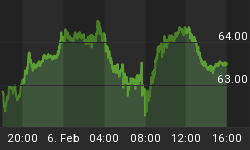Last week, as the corporate "earnings season" got underway and some 30 percent of S&P 500 firms reported their results from the first quarter of 2008, investors seized on any shred of positive news in the first wave of reports and sent share prices surging.
Looking beyond this first blush euphoria, the reports do contain some very interesting, and troubling, economic messages.
First, U.S. companies that have significant overseas markets for their products, such as Caterpillar, have shown a surge in sales. This is in line with our forecast of one of the few positive effects of U.S dollar weakness. It can be expected to continue in the short-term and even increase, if the Fed continues to lower U.S. dollar interest rates.
Second, for companies that have little international distribution but instead rely on sales to other U.S. corporations, major sales downturns have not been a major factor; at least, not yet.
Third, on the other hand, those companies whose profits depend on selling directly to the U.S. consumer, such as retailers and airlines, have suffered a serious erosion of their sales and earnings.
The forces behind these numbers are fairly easy to discern, and support the economic hypothesis that we have long predicted. The current economic downturn (which I expect to lead to severe recession) is being driven by a downturn in consumer demand, the effects of which are first seen in the retail sector. It is only when the retailers subsequently cut back on their purchases that wholesalers experience a downturn.
In addition, it appears that the rising inflation burden (as indicated by the relative difference between the Producer Price Index, increasing at over 7 percent, and the relatively milder level of the Consumer Price Index) is not yet being passed on to consumers, and is instead being absorbed by retail companies. Failure to raise prices in line with rising costs will likely lead to even further downward pressure on retail sector corporate earnings in the second quarter of 2008. Despite the seemingly "bargain basement" allure, investors should resist the temptation of buying these stocks at their current levels.
The fourth message from recent earnings announcements is that financial companies are still experiencing pressure from write-downs. I expect these pressures to continue as the current economic retraction deepens in the months ahead. Indeed, as I write, National City Bank has announced staggering quarterly losses and has expressed the need for a further $7 billion equity infusion.
The biggest surprise of the week just passed may be that while some financial firms, like Citigroup, posted losses, their stock prices subsequently rallied. The reason, of course, being that some investors and analysts had feared losses could have been much steeper, and the earnings reports sparked a sense of relief, even of hope, that the worst was now over.
This leads to another phenomenon that is characteristic of Wall Street's bias. In times of expected economic contraction, analysts almost compete to lower their forecasts of estimates of corporate earnings. Often they become overly pessimistic, only to raise the morale of their investors when the earnings, although badly down, are "ahead of estimates" and therefore "good", justifying new investment and "bottom fishing". We have seen this recently, particularly in the important financial sector, which is often seen as a market leader.
Despite the recent rallies, investors should not lose sight of the over-arching bearish trend in U.S. stocks. U.S. stock markets have posted losses in five of the past seven months. But that is only half the story. These losses have been compounded by the falling U.S. dollar. U.S. investors who remained locked into U.S. stock investments have to add these two downward impacts together, plus inflation, before they see a real return!
As I have said before, I feel that unstoppable economic forces now threaten deep and long lasting recession. Although the natural economic cleansing brought on by recession is clearly in the long-term interests of our economy, I doubt that our politicians will agree. The political cost of recession can all too easily result in politicians becoming un-elected.
It is therefore highly likely that the Fed, under heavy political pressure from the Treasury Department, will continue to adopt a weak dollar policy. Unfortunately, the hapless U.S. Dollar still has a long way to fall.
I continue to point to the attraction of the shares of sound, high earning companies traded overseas in sound currencies such as the Swiss Franc.
For a more in depth analysis of our financial problems and the inherent dangers they pose for the U.S. economy and U.S. dollar denominated investments, read Peter Schiff's book "Crash Proof: How to Profit from the Coming Economic Collapse." Click here to order a copy today.
More importantly, don't wait for reality to set in. Protect your wealth and preserve your purchasing power before it's too late. Discover the best way to buy gold at www.goldyoucanfold.com, download our free research report on the powerful case for investing in foreign equities available at www.researchreportone.com, and subscribe to our free, on-line investment newsletter at http://www.europac.net/newsletter/newsletter.asp.















